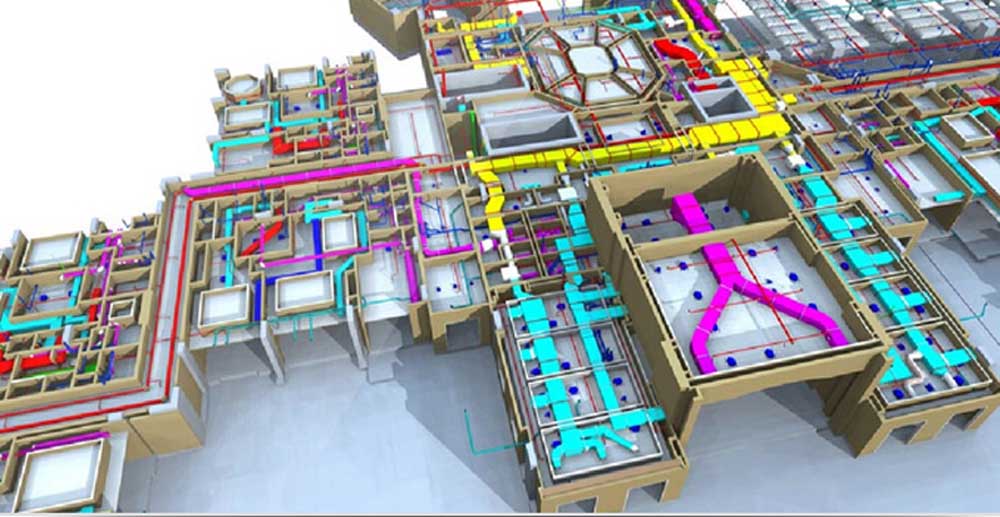What are the benefits of MEP?
- Controlled carbon dioxide emissions
In today’s modern construction projects, MEP places a focus on sustainable construction. Thankfully, MEP companies can address any needs and requirements to make your building more energy-efficient, whether you’re at the development stage or retrofitting a historical building. And since commercial buildings create greenhouse emissions thanks to cooling, heating, lighting and electricity, MEP utilises effective HVAC frameworks, decreasing water usage and embrace dynamic building designs.
- Reduced overall energy consumption
If you think about the major areas of consumption in a commercial building – HVAC, lighting, and other electronics – every instance of this consumption presents MEP companies with an opportunity to improve building performance through system components such as lighting device efficiencies as well as through building system controls such as day lighting.
- Utilises sustainable energy
The larger energy requirements of commercial buildings place a strain on the power grid, particularly in peak periods. MEP can decrease the measure of power a building generates through solar energy usage, which allows businesses to generate an infinite resource that allows them to independently create their own energy.
- Conserves water usage
Water is cheap, but it is often wasted, and leakage accounts for a large amount of this wastage. Thankfully, MEP can improve water efficiency through simple strategies such as touch-free taps and low-flow toilets before then moving on to more complex approaches.
How can MEP engineers help in construction?
MEP engineers can provide value at every stage of construction, from schematic design and administration to the post-occupancy survey. Playing an important role throughout the process, they can help maximise investment through a comprehensive array of services that include building evaluation, system diagnostics, feasibility studies and lease consultation services.
Over the course of a project, they’ll work with architects, building owners and other contractors, even at initial planning and survey stages. After evaluating the proposed site for damage and risks, a preliminary design is developed and refined in conjunction with the architect’s plans. They’ll also coordinate with pre-construction and project management teas to ensure the most efficient execution of all services, as well as conducting a Constructability Review to ensure all drawings and specifications are accurate, safe and synced up to the building owner’s vision.
Drawn up to serve as a working framework throughout the actual construction process, the MEP quality plan includes project goals, policies, insurance details, quality procedures, management structures, and personnel responsibilities among a whole host of other information.
Additionally, an MEP engineer will also manage the following construction documents:
- Detailed drawings and diagrams of all floor plans, elevations and sections.
- Technical specifications on the systems to be installed.
- Lists of materials and products required.
- Overview of the execution methods for the materials, products, and systems.
As the building undergoes construction or renovation, an MEP engineer will often assist in construction administration, ensuring the project is remaining on schedule and under budget, as well as providing progress reports.
Conclusion
When the three fields of MEP overlap in their design and implementation, MEP services are nearly always required. Building automation is an increasingly popular service that incorporates all aspects of MEP engineering, allowing for centralised hardware and software networks that control HVAC, security, fire alarms, indoor and outdoor lighting as well as many other operations critical for building performance. MEP engineers, in these initial stages of a construction project, help to reduce delays, confusion revisions and redrafting.
When a firm can handle all three MEP components, the project becomes much more streamlined, providing it with expertise that can help to reduce overhead while also making the most efficient use of your resources. Instead of dealing with time-consuming responsibilities attempting to look after all three separately, an MEP expert takes care of three simultaneously in a smooth, synchronised manner.
We hope you’ve enjoyed this article. There’s plenty more to be found over on the www.essconsmep.com
Looking for information about our MEP Engineering services? Visit our homepage www.essconsmep.com or call the team on +91 97129 46469.
Please contact us for all of your MEP service needs at Email: essconsmep@gmail.com or call us on +91 97129 46469
Visit us at www.essconsmep.com

